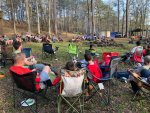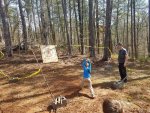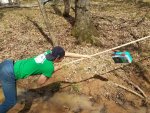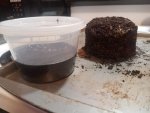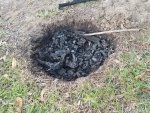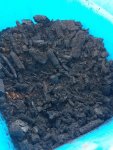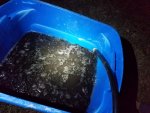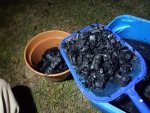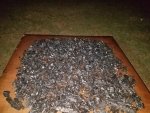Our first year starting a Trail Life ministry. It has been a year of fun, growth, an learning how to best mentor these young men.
We have camped, hiked, fort builds, assembled a catapult for an Easter event, cleaned up a park, fire dept your, and much more.
It has been tough to start up but the growth in the boys and their dads is so rewarding.
We put Christ in the center of everything.
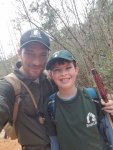
I'll share the devotional from my last camp out.
Hebrews 11:8-9 English Standard Version
8 By faith Abraham obeyed when he was called to go out to a place that he was to receive as an inheritance. And he went out, not knowing where he was going. 9 By faith he went to live in the land of promise, as in a foreign land, living in tents with Isaac and Jacob, heirs with him of the same promise.
Many biblical characters found themselves living the Nomadic lifestyle or as in King David’s case on the run or in hiding which led them into the wilderness.

Abraham was called by God from his home to a promised land. He and his family would live in tents (booths or tabernacles) built from plants, trees, and the skin of animals. Not having a permanent place to call home, they would move camp from place to place either for security, food, water, or following the commands of God.
Over generations, the Jewish people would find themselves slaves in Egypt and still without God's promised land. God would eventually call Moses to lead His people out of Egypt. Moses successfully freed his people after God destroyed Pharaoh and his army as they tried to pass through the Red Sea in pursuit of the Jews.
Back into the Wilderness
As the Jewish people were led into the wilderness once more, God would begin to make way for democracy and the foundation needed for a great kingdom. Moses would be given the 10 commandments and the many laws as prescribed in Exodus and Leviticus.

The Jewish Tabernacle would be prescribed in Exodus 25. This would be a portable tent specifically designed to be an earthly dwelling place for Yahweh the God of the Bible. Think of a temple before a permanent temple could be built.
The Indwelling of the Holy Spirit
Today this physical temple was only the shadow of what was to come with the indwelling of the Holy Spirit.
1 Corinthians 6:19 ESV
Or do you not know that your body is a temple of the Holy Spirit within you, whom you have from God? You are not your own,
Romans 8:9 ESV
You, however, are not in the flesh but in the Spirit, if in fact, the Spirit of God dwells in you. Anyone who does not have the Spirit of Christ does not belong to him.
Our bodies for the believer are now the temple in which God has chosen to dwell. From a physical temple to the flesh (Jesus), and then within you. A triune revelation of who God is. God the Father is omnipotent (all-powerful), omniscient (all-knowing), and omnipresent (everywhere), all holy, just, patient, loving, and despite the fall of man, He set in motion before time a plan to redeem mankind through the Son. In the very beginning, God chose to be, to indwell in His creation. Let there be light and before there ever was a sun, God's light prevailed. Similar to how in Revelation 21 says,
23 And the city has no need of sun or moon to shine on it, for the glory of God gives it light, and its lamp is the Lamb. 24 By its light will the nations walk, and the kings of the earth will bring their glory into it, 25 and its gates will never be shut by day—and there will be no night there.
When it came time, Jesus born of a virgin and the Holy Spirit, would be called Immanuel or “God with us”.
Then at Pentecost, the Holy Spirit came upon men and made its indwelling with the believers of Christ.
2 Corinthians 5:4-5 ESV
4 For while we are still in this tent, we groan, being burdened—not that we would be unclothed, but that we would be further clothed, so that what is mortal may be swallowed up by life. 5 He who has prepared us for this very thing is God, who has given us the Spirit as a guarantee.
The Feast of Booths or Tabernacles
(to indwell in tents)
Another reference to the use of tents is how God would prescribe different festivals to celebrate what the Lord has done or to ceremonially address sin. One of these festivals was called the Feast of Booths or Tabernacles.

Leviticus 23:33-44 ESV
33 And the Lord spoke to Moses, saying, 34 “Speak to the people of Israel, saying, On the fifteenth day of this seventh month and for seven days is the Feast of Booths to the Lord.
42 You shall dwell in booths for seven days. All native Israelites shall dwell in booths, 43 that your generations may know that I made the people of Israel dwell in booths when I brought them out of the land of Egypt: I am the Lord your God.”
The Feast of Booths was to provide a physical reminder of how God brought them out of Egypt, to encourage the Jews of the coming Messiah who would save them from their sins, and today to encourage the church of the return of Jesus Christ and the justice of evil.
Each year the Feast of Booths would require for many a pilgrimage to Jerusalem. Similar to how the tents are set up around the Tabernacle in image two, the whole countryside around Jerusalem and the temple would be littered with tents/booths.
The Indwelling of the Flesh
John 1:14 describes that God chose to become flesh and dwelt/tabernacle among us.
John 1:14 (ESV)
14 And the Word became flesh and dwelt among us, and we have seen his glory, glory as of the only Son from the Father, full of grace and truth.
The book of Hebrews mentions how the temple of Tabernacle was a shadow of what was to come. The Temple was designed with an inner area called the Holy place which was separated by a curtain. Behind the curtain, the inner sanctuary was called the Holy of Holies.
Hebrews 10:19-22 ESV
19 Therefore, brothers, since we have confidence to enter the holy places by the blood of Jesus, 20 by the new and living way that he opened for us through the curtain, that is, through his flesh,
By the death of Christ, the temple curtain was torn which represented a way being prepared for all who choose to have a direct relationship with God. We no longer need a high priest as Jesus became the Great High Priest. We may have the confidence to enter the holy places by the blood of Jesus. The curtain was torn just as His flesh.
21 and since we have a great priest over the house of God, 22 let us draw near with a true heart in full assurance of faith, with our hearts sprinkled clean from an evil conscience and our bodies washed with pure water.
As we camp in our tents let us remember the truths that come from the dwelling within a tent.
We should remember the lessons of the nomads who,
1. Depended daily for God's provisions
2. Respected God's natural creation
3. Family was so important as it took everyone to succeed while living in the wild
4. And not to get distracted by the present but to keep moving towards the promises of God.
1 Peter 2:11 ESV
Beloved, I urge you as sojourners and exiles to abstain from the passions of the flesh, which wage war against your soul.
Sojourners meaning foreigners or not a citizen but temporary passing through.
Philippians 3:20 ESV
But our citizenship is in heaven, and from it, we await a Savior, the Lord Jesus Christ,
Like the nomads, the tents represented a way of life. A people who greatly depended on the provisions of God. A people of promise. A people who were temporarily passing through.
Our citizenship is in Heaven, our promise is in salvation, let us not get distracted or weighed down by what is not needed or desired for such a journey. Keep moving closer to God and walk worthy of such a promise.
We have camped, hiked, fort builds, assembled a catapult for an Easter event, cleaned up a park, fire dept your, and much more.
It has been tough to start up but the growth in the boys and their dads is so rewarding.
We put Christ in the center of everything.

I'll share the devotional from my last camp out.
Living in the Wild
Hebrews 11:8-9 English Standard Version
8 By faith Abraham obeyed when he was called to go out to a place that he was to receive as an inheritance. And he went out, not knowing where he was going. 9 By faith he went to live in the land of promise, as in a foreign land, living in tents with Isaac and Jacob, heirs with him of the same promise.
Many biblical characters found themselves living the Nomadic lifestyle or as in King David’s case on the run or in hiding which led them into the wilderness.

Abraham was called by God from his home to a promised land. He and his family would live in tents (booths or tabernacles) built from plants, trees, and the skin of animals. Not having a permanent place to call home, they would move camp from place to place either for security, food, water, or following the commands of God.
Over generations, the Jewish people would find themselves slaves in Egypt and still without God's promised land. God would eventually call Moses to lead His people out of Egypt. Moses successfully freed his people after God destroyed Pharaoh and his army as they tried to pass through the Red Sea in pursuit of the Jews.
Back into the Wilderness
As the Jewish people were led into the wilderness once more, God would begin to make way for democracy and the foundation needed for a great kingdom. Moses would be given the 10 commandments and the many laws as prescribed in Exodus and Leviticus.

The Jewish Tabernacle would be prescribed in Exodus 25. This would be a portable tent specifically designed to be an earthly dwelling place for Yahweh the God of the Bible. Think of a temple before a permanent temple could be built.
The Indwelling of the Holy Spirit
Today this physical temple was only the shadow of what was to come with the indwelling of the Holy Spirit.
1 Corinthians 6:19 ESV
Or do you not know that your body is a temple of the Holy Spirit within you, whom you have from God? You are not your own,
Romans 8:9 ESV
You, however, are not in the flesh but in the Spirit, if in fact, the Spirit of God dwells in you. Anyone who does not have the Spirit of Christ does not belong to him.
Our bodies for the believer are now the temple in which God has chosen to dwell. From a physical temple to the flesh (Jesus), and then within you. A triune revelation of who God is. God the Father is omnipotent (all-powerful), omniscient (all-knowing), and omnipresent (everywhere), all holy, just, patient, loving, and despite the fall of man, He set in motion before time a plan to redeem mankind through the Son. In the very beginning, God chose to be, to indwell in His creation. Let there be light and before there ever was a sun, God's light prevailed. Similar to how in Revelation 21 says,
23 And the city has no need of sun or moon to shine on it, for the glory of God gives it light, and its lamp is the Lamb. 24 By its light will the nations walk, and the kings of the earth will bring their glory into it, 25 and its gates will never be shut by day—and there will be no night there.
When it came time, Jesus born of a virgin and the Holy Spirit, would be called Immanuel or “God with us”.
Then at Pentecost, the Holy Spirit came upon men and made its indwelling with the believers of Christ.
2 Corinthians 5:4-5 ESV
4 For while we are still in this tent, we groan, being burdened—not that we would be unclothed, but that we would be further clothed, so that what is mortal may be swallowed up by life. 5 He who has prepared us for this very thing is God, who has given us the Spirit as a guarantee.
The Feast of Booths or Tabernacles
(to indwell in tents)
Another reference to the use of tents is how God would prescribe different festivals to celebrate what the Lord has done or to ceremonially address sin. One of these festivals was called the Feast of Booths or Tabernacles.

Leviticus 23:33-44 ESV
33 And the Lord spoke to Moses, saying, 34 “Speak to the people of Israel, saying, On the fifteenth day of this seventh month and for seven days is the Feast of Booths to the Lord.
42 You shall dwell in booths for seven days. All native Israelites shall dwell in booths, 43 that your generations may know that I made the people of Israel dwell in booths when I brought them out of the land of Egypt: I am the Lord your God.”
The Feast of Booths was to provide a physical reminder of how God brought them out of Egypt, to encourage the Jews of the coming Messiah who would save them from their sins, and today to encourage the church of the return of Jesus Christ and the justice of evil.
Each year the Feast of Booths would require for many a pilgrimage to Jerusalem. Similar to how the tents are set up around the Tabernacle in image two, the whole countryside around Jerusalem and the temple would be littered with tents/booths.
The Indwelling of the Flesh
John 1:14 describes that God chose to become flesh and dwelt/tabernacle among us.
John 1:14 (ESV)
14 And the Word became flesh and dwelt among us, and we have seen his glory, glory as of the only Son from the Father, full of grace and truth.
The book of Hebrews mentions how the temple of Tabernacle was a shadow of what was to come. The Temple was designed with an inner area called the Holy place which was separated by a curtain. Behind the curtain, the inner sanctuary was called the Holy of Holies.
Hebrews 10:19-22 ESV
19 Therefore, brothers, since we have confidence to enter the holy places by the blood of Jesus, 20 by the new and living way that he opened for us through the curtain, that is, through his flesh,
By the death of Christ, the temple curtain was torn which represented a way being prepared for all who choose to have a direct relationship with God. We no longer need a high priest as Jesus became the Great High Priest. We may have the confidence to enter the holy places by the blood of Jesus. The curtain was torn just as His flesh.
21 and since we have a great priest over the house of God, 22 let us draw near with a true heart in full assurance of faith, with our hearts sprinkled clean from an evil conscience and our bodies washed with pure water.
Conclusions
As we camp in our tents let us remember the truths that come from the dwelling within a tent.
We should remember the lessons of the nomads who,
1. Depended daily for God's provisions
2. Respected God's natural creation
3. Family was so important as it took everyone to succeed while living in the wild
4. And not to get distracted by the present but to keep moving towards the promises of God.
1 Peter 2:11 ESV
Beloved, I urge you as sojourners and exiles to abstain from the passions of the flesh, which wage war against your soul.
Sojourners meaning foreigners or not a citizen but temporary passing through.
Philippians 3:20 ESV
But our citizenship is in heaven, and from it, we await a Savior, the Lord Jesus Christ,
Like the nomads, the tents represented a way of life. A people who greatly depended on the provisions of God. A people of promise. A people who were temporarily passing through.
Our citizenship is in Heaven, our promise is in salvation, let us not get distracted or weighed down by what is not needed or desired for such a journey. Keep moving closer to God and walk worthy of such a promise.
-
3
-
1
- Show all

